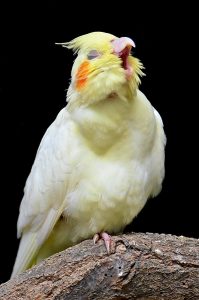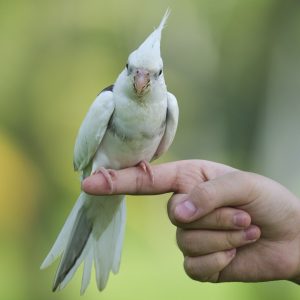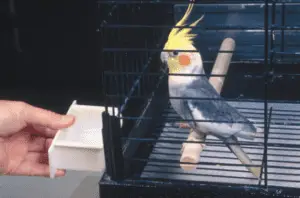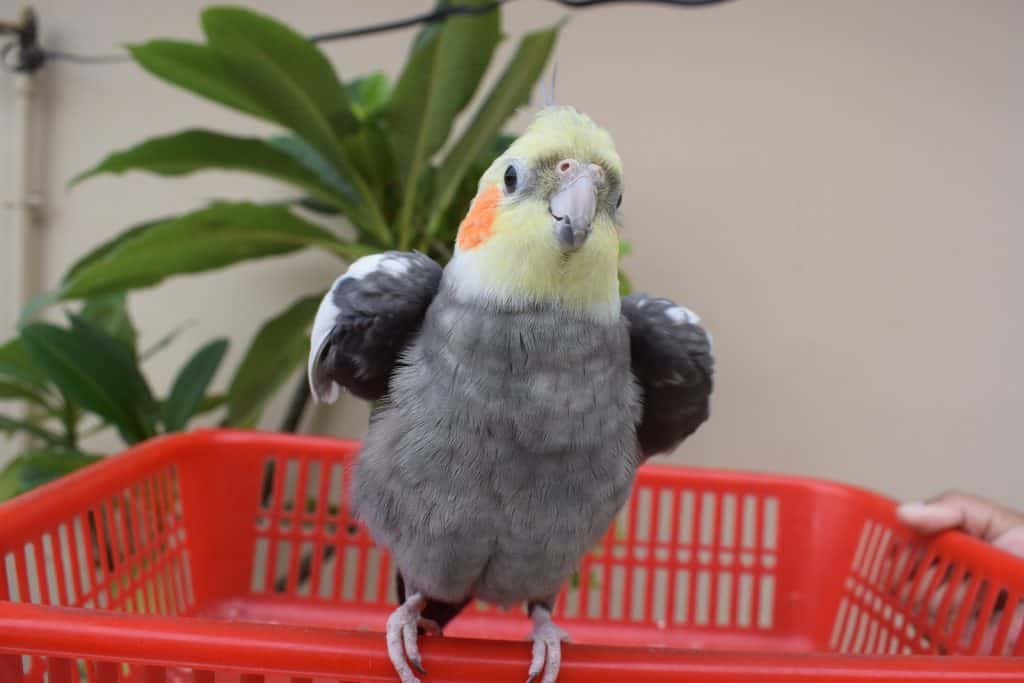Why does my cockatiel scream when I leave the room? This is a common question among pet owners who are new to dealing with these fascinating and intelligent birds. Both male cockatiel and female cockatiel can exhibit this behavior, showing distress and anxiety when you exit the vicinity. To fully understand these vocal expressions, it’s essential to first recognize that male cockatiel screaming and female cockatiel screaming can be attributed to different factors. Female cockatiels, just like their male counterparts, have unique personalities and means of communicating.
In some cases, a cockatiel screams excessively to the point where it becomes a challenge for both the bird and the owner. These very active birds require ample attention, care, and sometimes training, to ensure they lead a happy and healthy life. In this article, we will delve into the possible reasons behind the question, “Why does my cockatiel scream when I leave the room?” and explore potential solutions to reduce this behavior.

Why Does My Cockatiel Scream When I Leave The Room? (Possible Reasons)
Cockatiels are social animals that like to use their voices to communicate. It can be quite annoying when your bird screams every time you leave the room, but try to understand why the cockatiel is doing this before taking any action.
Cockatiels scream for different reasons, but if you study their behavior, you can help your cockatiel feel more comfortable and reduce its screaming when you’re away. Main causes of a cockatiel’s screams when leaving the room:
- Contact calling – This is how wild birds communicate with one another. If a wild bird or flock call screams for its flock, the flock will return the screaming to guide them back. Likewise, your cockatiel may be using this instinctual behavior to try to get you to come back to them.
- Boredom – When you leave the room, a bored cockatiel’s screaming in order to play and release its pent-up energy. In order to keep your feathered friend happy and content, make it a point to talk with it on a daily basis.
- Separation anxiety – Cockatiels are social animals, so it’s unsurprising that they get anxious when left alone. They understand separation from their human companion and will often cry out in order to be reunited.
- Fear – When you leave the room, your cockatiel may be scared or afraid of something. It may have seen a shadow or heard an odd sound. Or their cage covered might be hindering their sight.

How Do I Stop My Cockatiel From Screaming When I Leave The Room?
The important thing to remember is that you need to instill a feeling of safety in your cockatiel that is flock calling so that it knows you will return even if you go away. This can help prevent your cockatiel from screaming.
I suspect your birdie wants reassurance that you’re not leaving forever and that you’ll come back! If you have a particularly vocal bird that screams when you leave, there are some techniques that can help ease the screaming.
One way is to teach them phrases like:
“I’ll be right back,” or, if you’re feeling more like Arnold Schwarzenegger in The Terminator, “I’ll Be Back.” (Kidding!) Just like with people, it might take your cockatiel some time to learn the command. But once they understand that the phrase means you will return to them even after leaving for a bit, they’ll never forget it.
Leave, issue the command, and return as soon as possible. As you practice more, extend the length of time you are away from your cockatiel so that it gets used to seeing you go.
There are several ways to stop your cockatiel from screaming. One is to provide it with stimulating toys and an interesting environment to keep it occupied when you’re not around. Another quick fix is to make sure your cockatiel gets enough exercise every day.
- Challenges Your Parrot Mentally & Physically --- Toys are a necessity for parrots. They provide essential physical activity so that our intelligent feathered pets stay healthy. Bird Chewing Toy by SunGrow provides opportunities for parrots in the cage which they undertake when living in their native habitat. There are several multi-colored blocks in this single toy to make your bird active. These blocks are arranged in multiple layers to climb and explore.
- Entertaining Toy For Your Birds --- A parrot with nothing to do is a prime candidate for behavioral problems. Some parrots tend to be more disruptive during certain times of the year, usually during their breeding period. SunGrows bird chewing and preening toy is a perfect companion to keep your parrots busy, less disruptive and have more fun hours which keep them active mentally.
- Edible Chew Toy --- It is important for the avian species that we keep something for them to chew on. In their native habitat, they engage in chiseling holes and tearing up branches. This is something innate to them. The wooden blocks chew toy by SunGrow is made from wood and cotton rope. So when they nudge on to their toy, it would keep them content. So if you dont spot your green cheek outside playing, just hover a little inside. They might be hiding amongst the blocks and savoring them.
- Right Size For Your Bird --- The Bird Chewing Toy by SunGrow comes with a standard size of 40cm (15.7) x 10cm (3.9) and fits well in your beloved feathered pets cage. The included metal buckle holds this toy in place. Its crunch potential is ideal for small parrots and medium-sized, conure-sized birds. It is suggested for macaws, African greys, Cockatiels, Cockatoos, Budgies, Lovebirds, pigeons, and a variety of Amazon parrots as well.

Can Cockatiels Have Separation Anxiety?
Without social interaction, cockatiels become unhappy because they are dependent on their mate and flock by nature. If they don’t have an actual mate, cockatiels will often form bonds with their human companions instead.
Although this might appear to be a cute plan at first, many cockatiels become anxious when their partner leaves them for hours at a time while they work.
Your cockatiel’s separation anxiety may appear in numerous ways. For instance, your bird might scream endlessly when you’re not there, become aggressive, or start feather-picking.
A bird with separation anxiety is not ideal for either the bird or its recognized owner, and it may result in complaints from neighbors. As a result, you should work with your pet to reduce their stress while you’re gone. Even if your cockatiel is already attached to you, this can be addressed over time. You should limit the amount of attention you give your pet and avoid behaving like its partner.
This isn’t to say you shouldn’t pet or interact with your cockatiel but do so in moderation. Providing your cockatiel with cognitively stimulating toys while you’re not home will help it keep occupied, and providing a cockatiel’s cage that is big enough for it to move around in is also beneficial.
If nothing seems to help, getting another cockatiel is a tried-and-true approach to alleviate separation anxiety. Your cockatiel will have a buddy, so your birdie will have someone to play with while you’re away at work!

Bottom Line- Why Does My Cockatiel Scream When I Leave the Room?
It’s distressing for both you and your pet when they suffer from separation anxiety. Birds commonly vocalize or “scream” due to this discomfort, but there are thankfully ways to lessen the screaming. Your cockatiel needs to learn that it can trust you’ll return eventually even after leaving them alone. Only then will they feel more confident and comfortable.
Get advice on safe and suitable cage lining materials by visiting Can Cockatiels Eat Newspaper?
Although this won’t prevent your cockatiel from screaming, it is necessary to note that Cockatiels vocalize as a natural form of communication. There’s no need to worry if your bird screams occasionally. In fact, on the plus side, your cockatiel loudness is indicative of their love for you and wanting to be near you at all times.
- Why Is My Cockatiels Poop Watery
- Why Is My Cockatiel Vomiting
- Why Is My Cockatiel So Quiet
- Why Is My Cockatiel Shaking
- Why Is My Cockatiel Losing Feathers
- Why Is My Cockatiel Laying Eggs On Bottom Of Cage
- Why Is My Cockatiel Eating So Much
- Why Is My Cockatiel Chirping So Much
- Why Does My Cockatiel Scream When I Leave The Room
- Why Does My Cockatiel Nibble Me
- Why Does My Cockatiel Keep Yawning
- Why Does My Cockatiel Hang Upside Down
- Why Does My Cockatiel Fly On My Head
- Why Does My Cockatiel Face The Wall 6 Reasons
- Why Does My Cockatiel Bob His Head
- Why Does A Cockatiel Stand On One Leg
- Why Do Cockatiels Sing
- Why Do Cockatiels Hiss
- Why Do Cockatiels Have Crests
- Why Do Cockatiels Eat Their Poop
- Why Do Birds Rub Their Beaks
- Why Do Birds Poop In Their Water
- Why Cockatiels Like Head Scratches
- Why Cockatiels Grind Their Beaks
- Why Choose A Cockatiel Bird As A Pet
- Why Are My Cockatiels Tail Feathers Falling Out
- Why Are My Cockatiels Fighting
- Why Are My Cockatiels Feet Warm
- Why Are Cockatiels So Dusty




